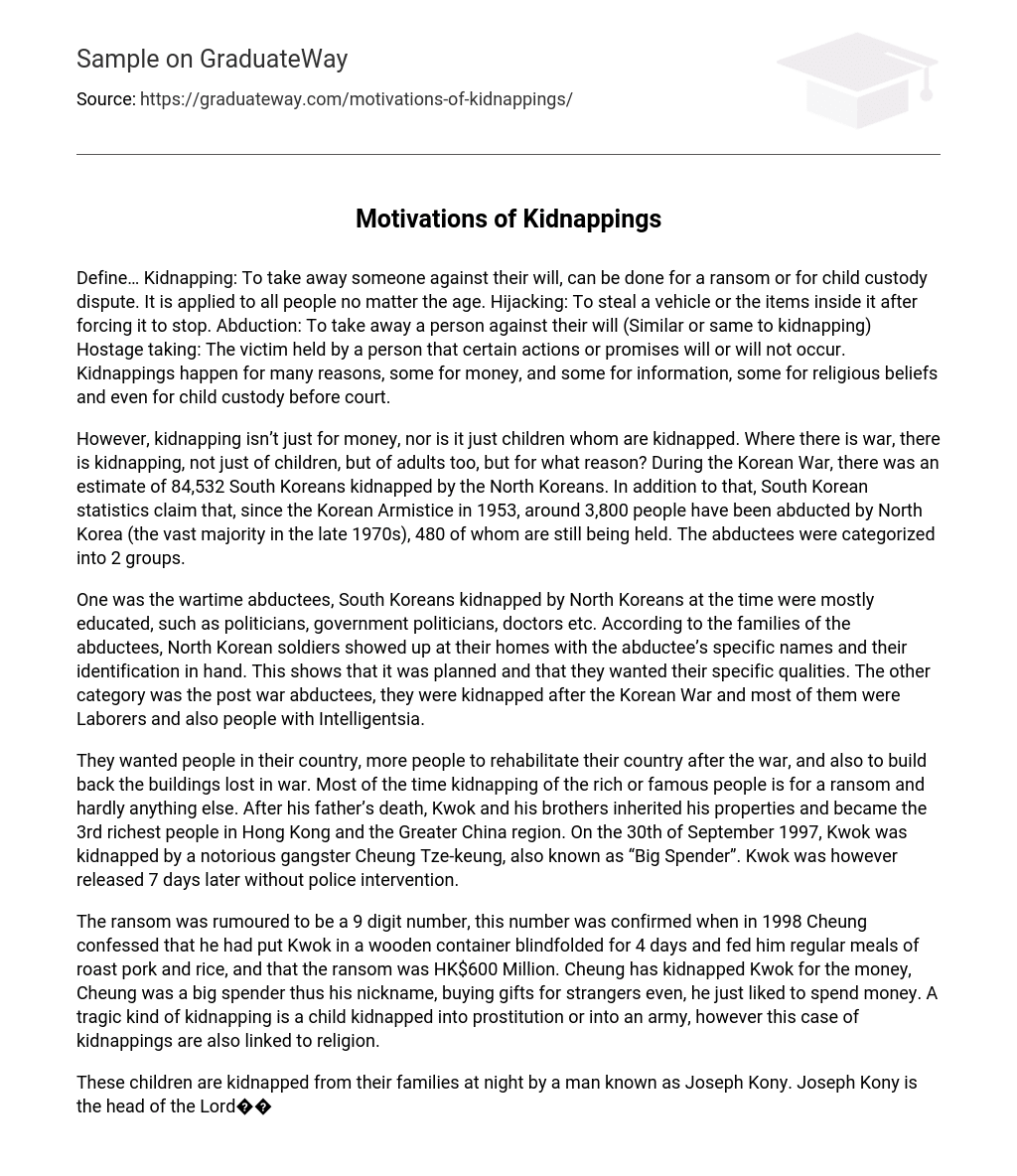Define… Kidnapping: To take away someone against their will, can be done for a ransom or for child custody dispute. It is applied to all people no matter the age. Hijacking: To steal a vehicle or the items inside it after forcing it to stop. Abduction: To take away a person against their will (Similar or same to kidnapping) Hostage taking: The victim held by a person that certain actions or promises will or will not occur. Kidnappings happen for many reasons, some for money, and some for information, some for religious beliefs and even for child custody before court.
However, kidnapping isn’t just for money, nor is it just children whom are kidnapped. Where there is war, there is kidnapping, not just of children, but of adults too, but for what reason? During the Korean War, there was an estimate of 84,532 South Koreans kidnapped by the North Koreans. In addition to that, South Korean statistics claim that, since the Korean Armistice in 1953, around 3,800 people have been abducted by North Korea (the vast majority in the late 1970s), 480 of whom are still being held. The abductees were categorized into 2 groups.
One was the wartime abductees, South Koreans kidnapped by North Koreans at the time were mostly educated, such as politicians, government politicians, doctors etc. According to the families of the abductees, North Korean soldiers showed up at their homes with the abductee’s specific names and their identification in hand. This shows that it was planned and that they wanted their specific qualities. The other category was the post war abductees, they were kidnapped after the Korean War and most of them were Laborers and also people with Intelligentsia.
They wanted people in their country, more people to rehabilitate their country after the war, and also to build back the buildings lost in war. Most of the time kidnapping of the rich or famous people is for a ransom and hardly anything else. After his father’s death, Kwok and his brothers inherited his properties and became the 3rd richest people in Hong Kong and the Greater China region. On the 30th of September 1997, Kwok was kidnapped by a notorious gangster Cheung Tze-keung, also known as “Big Spender”. Kwok was however released 7 days later without police intervention.
The ransom was rumoured to be a 9 digit number, this number was confirmed when in 1998 Cheung confessed that he had put Kwok in a wooden container blindfolded for 4 days and fed him regular meals of roast pork and rice, and that the ransom was HK$600 Million. Cheung has kidnapped Kwok for the money, Cheung was a big spender thus his nickname, buying gifts for strangers even, he just liked to spend money. A tragic kind of kidnapping is a child kidnapped into prostitution or into an army, however this case of kidnappings are also linked to religion.
These children are kidnapped from their families at night by a man known as Joseph Kony. Joseph Kony is the head of the Lord’s Resistance Army of Uganda. The LRA was made to turn Uganda into a Christian country as Kony thinks himself to be a Christian with good will. He also promised the people who joined the army that when they have control of Uganda, the laws will be based on the 10 biblical commandants. While the LRA enjoyed the strong public support, they soon turned on its supporters to supposedly purify the Acholi people and turn Uganda into a theocracy.
The female children whom were kidnapped were sold as sex slaves and any boys were turned into soldiers, and to think that they are the same age as us. After these children are kidnapped, they are sent to kill their own families. Kony also proclaimed himself to be the spokesperson of God or a spirit medium; this resulted in him being a person of the cult. Even the people who follow him believe that that he has been possessed. Though there are many forms of kidnappings, it is still the same thing. Abducting a human being away from the public eye and against their will. It is seen by all as a very inhumane thing to do to any human being.





